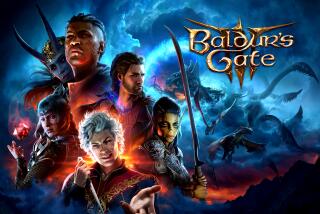Visiting Worlds You Won’t Want to Leave
- Share via
The problem with really good role-playing games is that the worlds they create are often far more engrossing and interesting than the everyday realms many of us inhabit. There’s a reason no one plays games called “Ultimate Office Politics” or “Quest for the Corner Office.”
Far more inviting, for the majority of players, is the prospect of slaying digital dragons and rescuing virtual vixens. So inviting, in fact, that players run a real risk of ending up in front of the computer screen swigging Diet Coke as they scramble for just a few more experience points before midnight.
That was me over a recent vacation that alternated between stretches of “Everquest” and bouts of “Baldur’s Gate.” Anyone who wants to see the game fan in their lives ought to keep them as far away as possible from these addictive games.
Both games drop players into fantasy worlds so full and rich, it’s easy to forget these are just games. “Baldur’s Gate,” for instance, stretches across five CD-ROMs. “Everquest,” which is an online game, forces players to interact with characters both live and digital to create a world that changes from minute to minute.
Truly, “Baldur’s Gate” and “Everquest” represent the happy intersection of technology and imagination. Both offer the sort of immersive game play fans long have craved but that always seemed just out of reach. With faster modems, better graphics capabilities and more storage space on even moderately priced PCs, designers finally are able to create the sorts of games everyone has dreamed about.
“Baldur’s Gate” takes place in the Forgotten Realms world of the Advanced Dungeons & Dragons universe. Don’t let that frighten players who may not be fans of AD&D.; Rightly or wrongly, AD&D; has the rap as being a realm of dorks who dress up on Friday nights in wizard costumes and roll funny-shaped dice. However one might feel about AD&D;, “Baldur’s Gate” transcends dorkdom and delivers an experience fans and novices alike can enjoy.
Players begin the game in the monastic town of Candlekeep without much money, without much skill and without much ability to do anything but learn about the world around them. Action takes place in real time, and players can guide their characters from place to place to learn new skills and run errands for money to buy weapons or supplies.
From there, the adventure begins as players explore the Sword Coast. Players can band with other characters in the game. In multiplayer mode, this adds the human aspects of AD&D; that a computer has a hard time emulating. But as in any good adventure role-playing game, players are advised not to slash everything or everyone they meet. Characters and objects hold clues about the adventure ahead.
Technically, “Baldur’s Gate” slinks along without a glitch. The interface is easy to master, and players can swap items around swiftly. The combat mode is intuitive, not nearly as clunky as many in past RPGs. And the story? Top-notch.
“Baldur’s Gate” requires a Pentium 166 with at least 16 megabytes of RAM and 300mb of available hard disk space. Recommended specs are a Pentium 200 MMX with 32mb of RAM and 600mb of available hard disk space. Players also need a video card with at least 2mb of RAM.
Early problems with the servers supporting “Everquest” prompted some wag to rename the game “Neverquest,” because that’s how long it seemed to take just to get rolling. Those problems have largely been fixed, and since shortly after it launched in the middle of March, the online game has hummed along nicely.
Good thing, because it would be a shame to see a game this good die because of technical problems. I hate using words like “groundbreaking” or “revolutionary” in a games column because tomorrow something even better will come along. But applying descriptors like that to “Everquest” would not be out of line. If online gaming hits as big as some think it will, games like “Everquest” will be the reason.
Even before starting the game, though, the server dumped 17 minutes worth of patches and updates onto my system. For players who are not members of Sony’s online gaming environment, the Station, expect to spend another few minutes doing that--and surrendering credit card information so Sony can ding the card for $10 a month after the first 30 days. (Note: This is a recurring charge, so players who get tired of “Everquest” should make sure to cancel their accounts promptly.)
Once begun, “Everquest” transports players to a three-dimensional world where many of the characters encountered are other people dialing in from across the country. They are rendered in realistic graphics. Everything about “Everquest” strives toward realism.
For instance, players start with some food and a few weapons, but no cash and no idea about what’s happening around them. The food lasts a while, but not long enough as the game requires characters to eat regularly to maintain health. The solution: Players can loot the bodies of enemies they defeat or they can get a job or they can fish and either eat the catch themselves or sell it to local shopkeepers.
Over time, players accumulate possessions and money, which they can deposit in the bank. In early levels, a nice feature is the ability to guard against attacks from other people. In other words, the only way to die in early levels is at the hands--or fangs--of computer-generated characters. That protects players from those who might slaughter novices for fun.
“Everquest” requires a Pentium 166 with at least 32mb of RAM. Players also need graphics hardware and a relatively speedy modem. And they need $10 a month--and lots of time.
Times staff writer Aaron Curtiss reviews video games every Monday in The Cutting Edge. To comment on a column or to suggest games for review, send e-mail to aaron.curtiss@latimes.com.
(BEGIN TEXT OF INFOBOX / INFOGRAPHIC)
Essentials
Baldur’s Gate
Platform: PC
Publisher: Interplay
ESRB* rating: Teen
Price: $39.95
Bottom Line: Five discs of fun
*
Everquest
Platform: PC
Publisher: 989 Studios
ESRB rating: Everyone
Price: $39.95
Bottom Line: An online obsession
*Entertainment Software Ratings Board
Next Week: “Combat Flight Simulator,” “Fighter Squadron,” “Luftwaffe Commander” and “X-Wing Alliance”
More to Read
The biggest entertainment stories
Get our big stories about Hollywood, film, television, music, arts, culture and more right in your inbox as soon as they publish.
You may occasionally receive promotional content from the Los Angeles Times.










